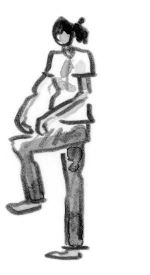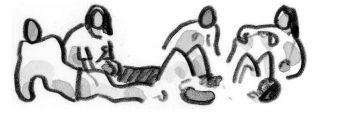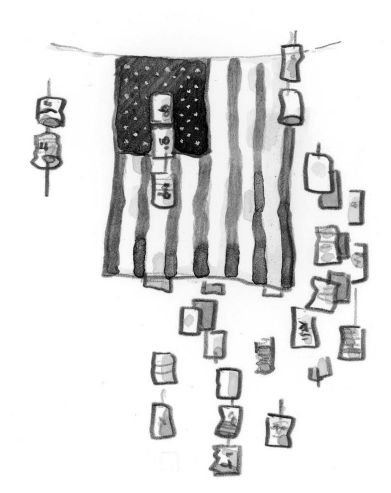Ridiculous/Hilarious/Terrible/Cool (24 page)
Read Ridiculous/Hilarious/Terrible/Cool Online
Authors: Elisha Cooper
She also took a self-portrait, presently in a trophy case in the atrium, in Cindy Sherman's style. Aisha's photograph shows her sitting at the edge of Lake Michigan swathed in an elaborate sari, with heavy makeup and a gold hoop through her nose (pierced on a trip to Pakistan and never worn at Payton because she considers it too conspicuous). She looks foreign, and not. Though, what does someone who is half-Colombian and half-Pakistani look like? Someone who was born in Ames, Iowa?
“I don't think anybody's sure where I am from. They're kind of confused,” she says.
In America, Aisha is Pakistani. In Pakistan, she's American. It means she's always an outsider, just like in high school.
The Shaikhs have finalized plans for their trip to Pakistan. After graduation, Aisha will fly with her brother to England, take a train to the Netherlands, and drive around Europe with friends from Egypt. Then, Karachi.
It's hot and unpleasant in Karachi in the summer, but that's when her cousin's wedding is. Aisha has loads of cousins. She likes some, others she finds too religious and overbearing. She thinks they are backward, coming as they do from villages with their hierarchy of male elders.
Her Pakistani relatives have their own views of Aisha. Because of outbursts she had when she was young, they nicknamed her
Sarely,
which means “whiny one.” They thought she was small and opinionated. As with any family, the feelings of closeness, and its opposite, can make things complicated. Sometimes more complicated. Aisha mentions that one of her cousins, to avoid an arranged marriage, flew to America and stayed with the Shaikhs.
Sarely,
which means “whiny one.” They thought she was small and opinionated. As with any family, the feelings of closeness, and its opposite, can make things complicated. Sometimes more complicated. Aisha mentions that one of her cousins, to avoid an arranged marriage, flew to America and stayed with the Shaikhs.
Aisha has taken control of her own matchmaking. She asked a boy to prom.
“He lives in Prowa?” she says, stumbling over the city's name. “Peoria? I don't know how to say it!”
Aisha knew the boy from when she lived in Cairo. His family owns some company and now he goes to high school in Prowa/ Peoria and will be traveling through Chicago on the weekend of prom. It seemed like an okay arrangement.
Aisha's art teacher walks up and interrupts the prom-planning. Two other art instructors come to the room and they spread Aisha's portfolio around the tables and stand back and stare, hands on chins. Students arrive for class and gather around the tables too. Everyone is very quiet, for a very long time. Then someone whispers,
“These are so good,”
as if only now aware that someone capable of this had been hidden in their midst this whole time.
“These are so good,”
as if only now aware that someone capable of this had been hidden in their midst this whole time.

Aisha blushes, right foot tucked underneath her left, looking at the art in front of her, tugging at the bottom of her shirt with the drawing of the tiger on it.
In the atrium, a class is layering strips of red tape on the floor. It's a combined physics and art project. They're constructing a twenty-foot-tall “perfect face.” A maintenance worker hears this and hoots, “Hey, that don't look like me!”
Anais walks past, her perfect face looking a little less perfect today. Pale, with dark liner under her eyes. Around her slim neck she has a gold chain, which she is fingering, pulling tight and twisting. She slumps onto a bench.
“Stressed. It's horrible. Tight muscles, severe headaches. I feel broken down. I feel sick, though I'm not.” She pauses, hands on throat. “I just want to sleep.”
Anais can't decide where to go to college. After a flawless audition, she was accepted into the ballet conservatory at Indiana, the place she always wanted to go. But then she was accepted by NYU.
Making a choice between the programs is tormenting Anais. They're very different: NYU specializes in modern dance, Indiana in classical ballet. NYU lets students choreograph pieces, Indiana is led by master instructors. NYU would give her a huge scholarship, and allow her to live with friends in Manhattan. Indiana would give her instruction more attuned to her strength in ballet, and allow her to live near cows in the Midwest.
Anais says if she could take the Indiana program out of Bloomington and place it in New York she'd do it
like that
.
like that
.
“It's the hardest decision of my life,” she says, hands still on her throat. “I can't concentrate.”
Last night she and her father talked until one in the morning. The conversation went nowhere. How do you say no to one of the best ballet conservatories in the country? How do you say no to a scholarship and New York City? The stress of making the decision follows her everywhere, even to the studio.
“When I'm dancing, I'm wondering where I want to
be
with dancing. When I'm in the studio, I think Indiana. When I get home, and talk to friends like Maya, I switch to NYU.”
be
with dancing. When I'm in the studio, I think Indiana. When I get home, and talk to friends like Maya, I switch to NYU.”
Indecision is eating her up. The stress will get so intense that on the day before Anais must decide, she will fly to New York. Then, there, she will know.
“If you want to be more influential, you got to step your game
up!
” Anthony barks at a friend. It is unnecessary to mention that Anthony is in the cafeteria, in his same seat, leaning against the same wall.
up!
” Anthony barks at a friend. It is unnecessary to mention that Anthony is in the cafeteria, in his same seat, leaning against the same wall.
Anthony's friend is wearing an oversized Atlanta Falcons hat over his cornrows, a Chicago Bulls jersey down to his thighs, and red socks up to his knees. He's lying flat on the table next to Anthony, looking upside down at a chorus of admiring girls.
“I don't
care
. Look at this shit. It's a
new style!
” barks the friend from his horizontal position.
care
. Look at this shit. It's a
new style!
” barks the friend from his horizontal position.
The style in question: rubber bands worn around the tops of one's socks. The girls at the table are discussing whether or not this will cut off the circulation to the boy's feet and cause gangrene. Amputation seems probable. Anthony shakes his head at this foolishness, takes a roll of money out of his front pants pocket, and starts counting.
“He look a damn fool,” Anthony mutters to himself. When he's finished counting his roll, he puts it away and starts smoothing the silver sticker on his White Sox hat. He's trying to maintain its “freshness.”
“When your sticker comes off, time to let the hat go,” he says, explaining the not-so-obvious. Anthony is in a grumpy mood. There are other things he's letting go.
“I'm
done
with Payton girls. It's
official.
I got my feelings hurt.”
done
with Payton girls. It's
official.
I got my feelings hurt.”
The last few weeks, Anthony was hanging out with a sophomore girl. It took effort, going after school with the girl and her friends to the nearby Popeye's. But now she has a boyfriend, one of the boys that was going with them to Popeye's. Another disappointment.
His report card also came out last week.
“I haven't seen it. . . . All I know is it was bad.”
His mother was required to come to Payton to pick it up. She phoned Anthony and told him he was failing everything, then hung up. The odd thing is that Anthony says his classes are not so hard.
“
That
ain't never been a problem. I just don't be
doing
my homework.”
That
ain't never been a problem. I just don't be
doing
my homework.”
When Anthony leaves Payton for the day he doesn't think about school until the following morning. After school is just that.
After school.
Others can study. That's not him. Instead of doing his homework, Anthony smokes weed with one of his cousins, plays basketball with his brother, and eats dinner. Last night Anthony ate a tuna sandwich alone (his mother got a new job at a nursing home and hasn't been around much). Sometimes he watches television.
After school.
Others can study. That's not him. Instead of doing his homework, Anthony smokes weed with one of his cousins, plays basketball with his brother, and eats dinner. Last night Anthony ate a tuna sandwich alone (his mother got a new job at a nursing home and hasn't been around much). Sometimes he watches television.
“I watch
Prison Break
on Mondays.
Lost
on Wednesdays. I don't watch on Tuesdays.”
Prison Break
on Mondays.
Lost
on Wednesdays. I don't watch on Tuesdays.”
Next week, Anthony's physics class is taking a field trip to Six Flags Great Adventure, but Anthony won't be allowed to go because of his poor grades. His physics teacher, Mr. Dyson, has a rule about that. Anthony says he would like to raise his grades, but . . .
He sneezes. “You gotta
brace
yourself for a sneeze so you don't blow your back out.”
brace
yourself for a sneeze so you don't blow your back out.”
Anthony looks around the cafeteria. The friend with the cornrows has left, wrapping up his female admirers and taking them with him. Anthony snorts. It's been a depressing spring, all in all. He takes his money roll out of his pocket and counts it a second time, as if to see whether it's grown. The roll is made up of ones.
MAY
Afternoons are for doodling. Especially in the classrooms with views of downtown. There's so much to get lost in: skyscrapers, airplanes heading east, window-cleaners who look like rock-climbers.
When the teacher's back is turned, a wrapped piece of gum soars across the room. The teacher turns around. He turns back and two girls mouth a conversation across the room.
“Are you going to --------”
“Where?”
“To -------!”
“What?”

“Later.”
In the field next to Cabrini Green, a phys ed class is picking tree blossoms. Girls line blossoms on their forearms, or blow them off their palms. A boy hangs from the branch above the girls, flexing his biceps. After he falls to the ground, everyone lurches into the nearby playground to kick some balls. As they do, it seems that what is being learned in phys ed is confidence in the lack of physical confidence, and in this the students play together as if they were a team.

Some students are still keeping up appearances. Daniel, in a red-striped Michael Kors dress shirt, looks especially sharp today. The red shirt matches the rest of the atrium: the red paper lanterns hanging from the balconies, the red banners on the walls, the red papier-mâché dragons guarding the library. Students were told to wear red today for the ceremony commemorating the school's new Chinese Confucius Institute, so Daniel did.
Daniel hasn't been thinking much about not getting into Harvard. Sometimes he wonders if all his extracurriculars may have kept him from his schoolwork. He thinks if he'd done
 better in his classes, maybe things would have been different. Those four B's probably didn't help. He sees that now. He says he has no regrets.
better in his classes, maybe things would have been different. Those four B's probably didn't help. He sees that now. He says he has no regrets.

Other books
Bridge to Terabithia by Katherine Paterson
Goodnight Tweetheart by Teresa Medeiros
Badger's Moon by Peter Tremayne
Zapatos de caramelo by Joanne Harris
The City of Gold and Lead (The Tripods) by Christopher, John
Falling into Forever (Falling into You) by Abrams, Lauren
Covet Not by Arden Aoide
Hot Girlz: Hot Boyz Sequel by Monteilh, Marissa